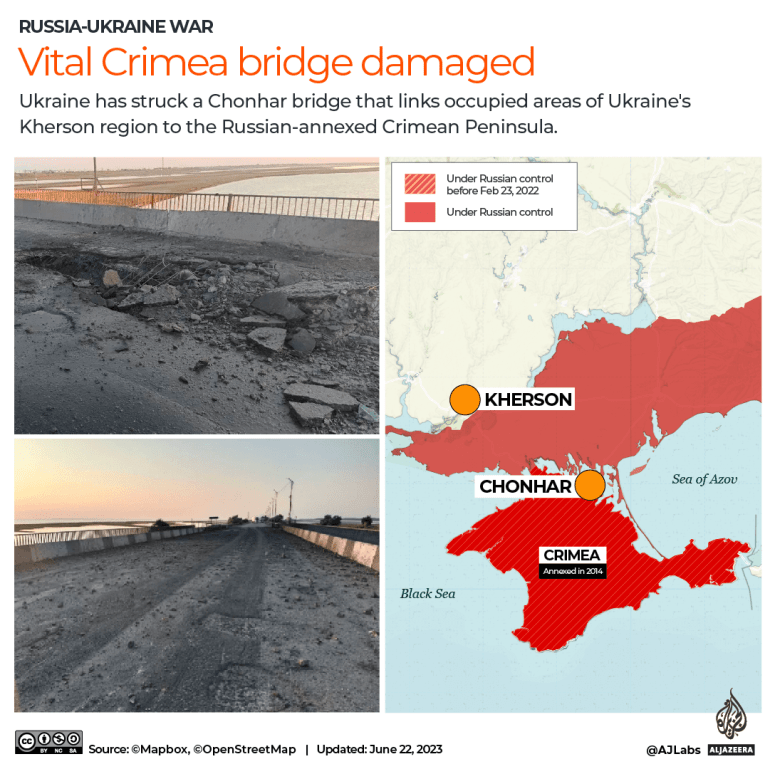
Wagner chief Yevgeny Prigozhin ordered his mercenaries to halt their march on Moscow to avoid “shedding Russian blood” and agreed to live in exile in Belarus – ending one of the biggest challenges to President Vladimir Putin’s decades-long rule.
Prigozhin said while his men were just 200km (120 miles) from the Russian capital, he decided on Saturday to turn them back to prevent killings.
“They wanted to disband the Wagner military company. We embarked on a march of justice on June 23. Now, the moment has come when blood could be spilled,” said Prigozhin in an audio message.
“Understanding responsibility [for the chance] that Russian blood will be spilled on one side, we are turning our columns around and going back to field camps as planned.”
Moscow braced for the arrival of the private army led by the rebellious mercenary commander by erecting checkpoints with armoured vehicles and troops on its southern edge. Red Square was shut down and the mayor urged motorists to stay off some roads.
Wagner’s lightning insurrection appeared to develop with little pushback from Russia’s regular armed forces, raising questions about Putin’s grip on power in the nuclear-armed nation even after the abrupt halt to Wagner’s advance.
Belarusian leader Alexander Lukashenko negotiated with the mercenary boss to stop Wagner’s troop movement after discussing the issue with Putin.
Prigozhin accepted Lukashenko’s offer to halt the Wagner group’s advance and further steps to de-escalate the tensions, Lukashenko’s office said, adding the proposed settlement contains security guarantees for Wagner troops.
Prigozhin did not say whether the Kremlin responded to his demand to remove Defence Minister Sergey Shoigu.
The Wagner chief will move to neighbouring Belarus as part of the deal and the criminal case against him will be closed, the Kremlin said on Saturday.
Prigozhin’s troops who joined him in the uprising will not face prosecution and those who did not will be offered contracts by the defence ministry, spokesman Dmitry Peskov said.
Lukashenko offered to mediate, with Putin’s agreement, because he had known Prigozhin personally for about 20 years, Peskov said. “Avoiding bloodshed, internal confrontation, and clashes with unpredictable results was the highest goal.”
‘What’s really going to happen’
Putin faced the biggest threat to his 22-year rule yet with rebel mercenaries advancing towards the Russian capital after seizing a key southern military base. Wagner began pulling back fighters and equipment from the Russian city of Rostov-on-Don late on Saturday.
Pavel Felgenhauer, a Russian defence analyst, said it remained to be seen how the incident plays out.
“What’s really going to happen, we’ll have to see tomorrow. And who actually did give which concessions to whom,” he told Al Jazeera. “Ceasefires don’t hold that easily. Before you see the small print, it’s not the time to say that it’s over. It can easily unravel in an hour or two, or tomorrow.”
Anna Matveeva, from the Russia Institute at King’s College London, said the events marked a significant change for Russia’s political landscape.
“It’s the first chapter in Russia’s political transition. That’s the opening bid. We will see more developments to come,” she told Al Jazeera.
Back to Africa?
If he accedes to Prigozhin’s demand to remove Shoigu, Prigozhin would emerge from the crisis as a clear winner in a major blow to Putin’s authority.
If Prigozhin agreed not to press the demand, Putin could award him with more lucrative government contracts like those on which he has built his fortune in the past.
However, it would be awkward and politically damaging for Putin to backtrack after branding Prigozhin a backstabbing traitor.
Some observers speculated that Prigozhin could make concessions such as putting the Wagner Group under federal authority, or he could shift the force’s activities back to Africa, where his mercenaries have been active in recent years.

‘Suffer inevitable punishment’
In a televised speech to the nation, Putin called the rebellion a “betrayal” and “treason”.
“All those who prepared the rebellion will suffer inevitable punishment,” Putin said. “The armed forces and other government agencies have received the necessary orders.”
Authorities declared a “counterterrorist regime” in the capital and its surrounding region, enhancing security and restricting some movement. On the southern outskirts, troops erected checkpoints, arranged sandbags and set up machine guns.
Ukrainian President Volodymyr Zelenskyy said on Saturday the revolt by Wagner troops exposed complete chaos in the country.
“Today, the world can see that the masters of Russia control nothing. And that means nothing. Simply complete chaos. An absence of any predictability,” Zelenskyy said in his nightly video address.
Addressing Putin while switching from Ukrainian to Russian language, Zelenskyy said, “The longer your troops remain on Ukrainian land, the greater the devastation they will bring to Russia.”







